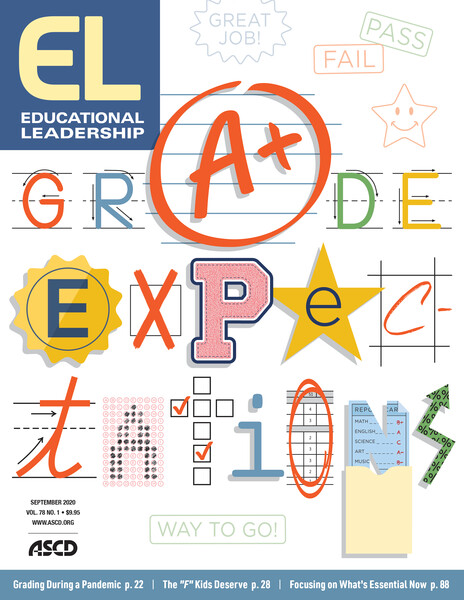September 1, 2020
•
5 min (est.)•
Vol. 78•
No. 1ASCD Policy Priorities / Rising (Again) to the Challenge
Educators must continue to lead in the response to the pandemic.

Ignore the carping. The criticisms of the naysayers and never-satisfied are but a distant memory from last spring, which in COVID-19 time feels like a decade ago. When the annals of our schools are written, the mass school shutdown due to COVID-19 will be appreciated as one of public education's finest hours.
Which and how many of our public institutions could've done what school systems in 38 states did in March? With, sometimes, only 72 hours notice, school buildings were shuttered, normal operations ceased, and teachers and students were sent home for the remainder of the school year.
Amidst this challenging environment where they were uprooted and working remotely, too, school leaders managed to organize supplying laptops and Chromebooks to students who lacked the technology to access online learning. They planned and undertook the delivery of distance learning to millions of students. Most important and impressively, schools barely skipped a beat in continuing to deliver school meals to the 30 million students who were daily getting free or reduced-price lunches at school.
Taken as a whole, the effort to reposition, resupply, retrain, and even reprovision students and teachers is a feat for the history books, akin in dexterity, derring-do, and scale to General George Patton's Third Army relief of the embattled 101st Airborne at the famed Battle of the Bulge.
But educators have had little time to bask in their accomplishments. As was true for Patton in the fight against the Wehrmacht in December 1944, for educators the war against the virus is ongoing. Even as they tried to support their students in the moment, planning and preparation got underway for the start of the 2020–21 school year. School leaders have had to do all this amid a cacophony of contradictory advice and a shocking lack of support from policymakers.
As I write this in the summer, it seems clear that state and local school leaders won't get much help from federal officials when it comes to preparing and reopening schools. The most recent school guidance from the Centers for Disease Control (CDC) is a one-page "decision tree" that is unfortunately far too superficial and simplistic for the crisis schools are dealing with, and unworthy of the world's premier health protection agency.
While most U.S. schools pivoted to a distance-learning-only approach (and statewide stay-at-home orders sent unemployment skyrocketing), the federal government has so far only earmarked a meager $13 billion for K–12 education and $9 billion for the school meals program under the $2 trillion COVID-19 relief package, the CARES Act.
The Economic Policy Institute has estimated that 468,000 K–12 jobs have been lost since March—more than were lost in the Great Recession of 2008. Half of those eliminated jobs were for special education, teaching assistant, or tutor positions. And that was before states and school budgets for FY21 were revised downward due to drops in revenue. Schools are also being squeezed with rising costs for reconfiguring classrooms, technology purchases, and the need for more staff—not less—to work with smaller groups of students and to provide more frequent, extensive cleaning.
The expression of schools' financial needs and dire fiscal forecasts have been met with skepticism by some policymakers. At a June 15 committee hearing, Rep. Virginia Foxx (R-NC), the ranking Republican on the House Education Committee said, "demanding additional funds at this time is premature and illogical." There has also been a resurgence of the wishful thinking about "reimagining" education. Some are using the public health crisis as an opportunity to double down on the very technology and distance-learning approaches that have proven woefully inadequate so far—and left large swaths of parents and students unsatisfied with the experience.
Some political leaders are insisting that schools have to fully re-open, despite pandemic-related safety concerns. Senator (and doctor) Rand Paul (R-KY) tweeted for schools to restart because the virus' fatality rate for those under age 25 is "0.00008 percent, or roughly one in 1.25 million." His call seems to overlook the age and health conditions of teachers, administrators, and support staff in schools—and the health of family members when children return home.
"Reopening" suggestions have poured in. Have students repeat their current grade. Switch on the fly to competency-based education. Let elementary students return, but keep secondary students learning from home. Stagger schedules. Live stream in-class lessons. Give families the option of part-time in-person school or full-time online learning. And on and on. Some suggestions are practical, some innovative, some at least feasible, and some—like expanding school choice—are just an effort to promote a particular ideology.
There are no simple or cheap solutions to reopening during a pandemic. School closures have only highlighted—or exacerbated—systemic inequities that have been ignored for years. Perhaps the best that can be said is that the pandemic (and the Black Lives Matter movement) have forced a reckoning with long-entrenched problems. For instance, trying to provide online access to approximately 10 million students without a home internet connection has showcased the real-world impact of the abstract notion of the "digital divide." Similarly, the need to replace—for safety—the HVAC or plumbing of one-half of all school buildings revealed problems with structural upkeep identified by a June 2020 GAO report. Such items will cost billions.
Even amidst a public health emergency, it seems there still isn't the political will to provide students and schools with the resources needed to remain safe and healthy–to say nothing of being ready for college and career. Educators need to press their case to national and state leaders about their experiences and needs in the Age of Coronavirus—just as health care workers have borne witness to the ravages of COVID-19 on patients in hospitals.
What we need most are those with imagination, can-do spirit, and generosity to rise to the occasion. America's educators met the challenge admirably in spring. They've done it before and I believe they will do so again this fall, for the sake of students, schools, and communities—and the 2020–21 school year.
End Notes
•1 Gould, E. (2020, June 3). Public education job losses in April are already greater than in all the Great Recession. [blog post]. Working Economics Blog, EPI.
•2 Opening statement of Rep. Virginia Foxx at June 15, 2020 House Education Committee hearing.
•3 Government Accounting Office (2020). School districts frequently identified multiple building systems needing updates or replacements. GAO Report 20-494.






